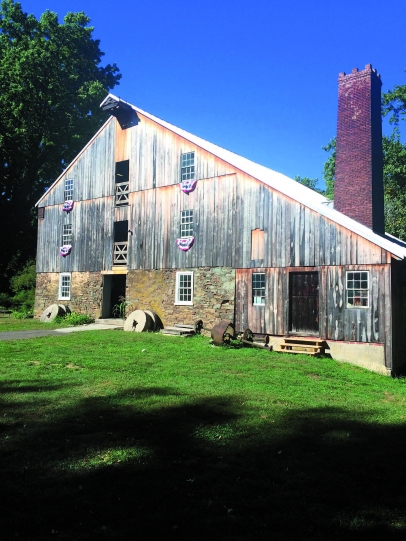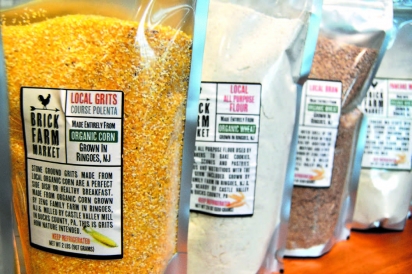TIDBITS: LOCAL WHEAT, LOCAL FLOUR
A restored grist mill makes it possible
A search for poultry feed inadvertently landed Jon McConaughy at the epicenter of the newest locavore craze—the quest for locally grown and milled grains. As the owner of Double Brook Farm in Hopewell, McConaughy found a feed supplier in Zeng Farm, an organic grain grower just up the road in Ringoes. Their business relationship quickly expanded beyond barnyard feed to include organic grains that are milled into fresh flour for McConaughy’s Brick Farm Tavern and Brick Farm Market.
Brick Farm Local Flour took root a few years ago when the Zeng family grew a small plot of hard winter wheat. Some of their home-milled flour went to McConaughy, who passed it on to his baker. The flavor and texture of the resulting baked goods inspired McConaughy to ask for delivery of 100 pounds of flour a week. With a homemilling rate of five pounds per hour, Zeng declined the order but planted a larger patch of that same wheat the following year. The result was 10,000 pounds of wheat—a harvest that sent McConaughy in search of a miller who could turn that grain into flour.
The Delaware Valley was once home to many small creekside community grain mills. Railroads and technology eventually removed the need for local grains and water-powered milling. And stone grinding was replaced by roller milling, which created inexpensive flour made shelf-stable by removing the germ and bran. These advances ended local milling and sacrificed the flavor and nutrition that are the hallmarks of fresh flour.
Fortunately for McConaughy, Mark and Fran Fischer had painstakingly restored Castle Valley Mill, an 18th-century grist mill on the banks of Neshaminy Creek near Doylestown, PA. In their mill, a bewildering array of interconnected leather belts and iron wheels runs equipment that spans a hundred years of milling technology. That equipment cleans, grinds and sifts wheat, corn, oats and rye for the Fischer’s Castle Valley label, and custom mills Zeng’s organic grains for Brick Farm.
True stone-ground flour contains the germ and bran, making it a perishable product that must be refrigerated. Giant commercial mills blend their flour to make it consistent from batch to batch. Not so with fresh local flour, which requires bakers to work more by feel than by formula. After months of experimentation, all of the bread and pasta and most of the pastries at Brick Farm Market and Tavern are now made exclusively from their custommilled flour.
Brick Farm now offers home bakers the chance to work with fresh flour made from local organic grains. Check the refrigerated case at Brick Farm Market for Brick Farm whole wheat, allpurpose and pastry flour as well as rye berries, rye flour, cornmeal and grits.
—Fran McManus
BRICK FARM MARKET
65 East Broad St., Hopewell
609.466.6500 brickfarmmarket.com
PHOTOGRAPHS: COURTESY OF CASTLE VALLEY MILL AND BRICK FARM MARKET






